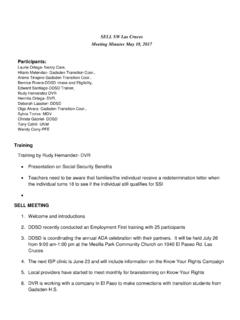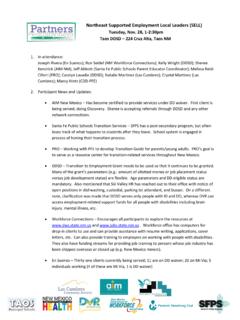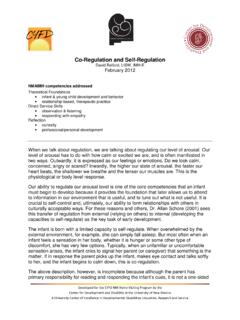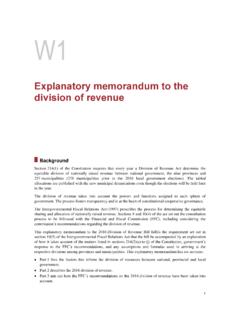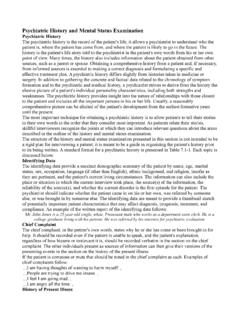Transcription of EXPLANATION OF EARLY CHILDHOOD TRANSITiON TERMS
1 EXPLANATION OF EARLY CHILDHOOD TRANSITiON TERMS Frequently used TERMS in EARLY CHILDHOOD TRANSITiON are Notification, TRANSITiON Planning, Referral, Prior Written Notice, Informed Parental Consent, and TRANSITiON Conference. These TERMS have specific meanings and timelines associated with them. Notification: The FIT Program service provider agency or EARLY Intervention (EI) Agency must routinely notify the Local Educational Agency (LEA) of children who reside in the LEA s jurisdiction and who are potentially eligible** for Part B services.
2 The notification list includes children who will turn three within the next 12 months. ** potentially eligible is considered to be those children eligible under the Part C s established condition or developmental delay categories. Notification includes: the child s first and last name and middle initial child s date of birth the name of the LEA in which the child resides contact information for the parents The purpose of notification: Meet the requirements of Child Find, which is a required part of IDEA for both Part C and Part B Programs.
3 Support efforts for LEAs to have eligibility determined and an IEP developed and implemented for eligible children by the child s third birthday Allow the LEA to plan for the future and estimate the number of classes needed, potential staffing, and instructional needs Allow both LEA and local FIT provider to plan for upcoming TRANSITiON conferences throughout the year TRANSITiON Planning: The family service coordinator plans with the family steps and activities to promote an effective TRANSITiON for the child and family. For all children receiving FIT services, the TRANSITiON plan will be: Initiated at the child s initial IFSP meeting and the family service coordinator will inform the parent(s) regarding the timelines for their child s TRANSITiON At 24 months of age, the TRANSITiON plan will be updated to include documentation that the family service coordinator has informed the parent(s) of the EARLY CHILDHOOD TRANSITiON options for their child.
4 The family service coordinator will assist the family in visiting any of these settings At least 90 days and not more than nine months before the child s third birthday, the TRANSITiON plan shall be finalized at an annual IFSP or TRANSITiON conference meeting LEA staff are not required to participate in TRANSITiON planning before the TRANSITiON Conference, however, they are encouraged to routinely communicate with FIT providers about public school Referral: The family service coordinator, with parental permission, will complete and submit the State TRANSITiON Referral Form to the LEA.
5 The TRANSITiON referral includes: The Federal Office of Special Education Programs (OSEP) has declared an exception to FERPA which allows the Infant-Toddler Program to disclose, without parental consent, a child s personally identifiable information to an LEA prior to TRANSITiON in order for the LEA to meet its Child Find obligations. (Paraphrased from US Department of Education OSERS Policy Letters February 11, 2014 Letter to Mary Elder.) 1 Child s name & date of birth, Child s address of residence, Contact information for the parent(s), including name(s), address(es), and phone number(s) The TRANSITiON Referral Form: Sent to the LEA at least 60 days prior to the TRANSITiON Conference If possible, sent at least 6 months prior to the child s third birthday for all children eligible for Part C under Established Condition or Developmental Delay.
6 Children who are eligible under the at risk categories may be referred if there is increased concern about their development Informed Parental Consent: This means the parent has been fully informed of all information relevant to the activity for which consent is sought in the parent s native language or mode(s) of communication and agrees in writing to the activity for which consent is sought. The parent understands that the granting of consent is voluntary on the part of the parent and may be revoked at any time. However, if the parent revokes consent, that revocation does not apply to any action that occurred before the consent was revoked.
7 Prior Written Notice: Written notification to parents ensuring they are fully informed regarding whatever action the lead agency or EI provider is proposing to take (or not take) with their infant or toddler or with the family. Parental consent is often needed before the lead agency or EI provider may proceed, and that consent must be informed. TRANSITiON Conference: The Family Service Coordinator, with parental approval, will convene a TRANSITiON Conference. This is an opportunity to: share information regarding the needs of the child and family discuss services that the child may receive under Part B, review program options from the child s 3rd birthday through the remainder of the school year When does the TRANSITiON Conference Occur?
8 No later than 90 days (and at the discretion of the IFSP team, not more than 9 months) before the child s third birthday ** However, the IEP must be implemented by the child s third birthday. Who attends the TRANSITiON Conference? the parent(s) two or more individuals from separate disciplines or professions within the FIT program, one of whom must be the family service coordinator LEA representative(s) (legal responsibility to attend) any other agency considered for future services other attendees might include Head Start, child care, home visiting, medically fragile, child protective services, physicians and other medical staff, NM School for the Deaf, and the NM School for the Blind and Visually Impaired other family members, an advocate or person outside of the family ** All TRANSITiON conference attendees are invited with parent permission.
9 For additional TRANSITiON related information or resources, please go to: New Mexico EARLY CHILDHOOD TRANSITiON Initiative Funded by and developed in collaboration with the NM Department of Health Family Infant Toddler Program 2

